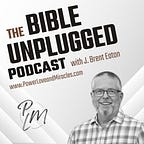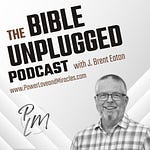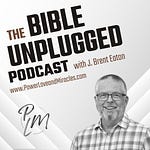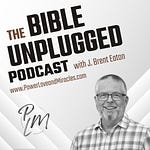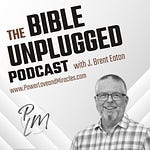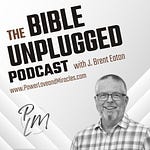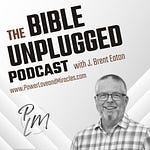Introduction
• The Gospel of John has a different take on the Easter story than Matthew, Mark, and Luke. The differences can be passed off as errors, but John has a divine purpose in his version of the Easter story: Jesus is the ultimate Passover lamb who takes away the sin of the world.
• I’m Brent and this is episode 28 of The Bible Unplugged. We continue the series, “Easter Unplugged,” with a deep dive into the story of Jesus entering Jerusalem at the beginning of Passover Week. There are some details that mean a lot but aren’t often discussed.
• Please take a minute to look at the show notes for this episode at PowerLoveandMiracles.com under the Podcast tab. While you are there, please subscribe to receive notifications of future episodes.
Why is John Different?
• As we talked about in episodes 20 and 27, the Gospel of John takes a completely different approach to the life of Jesus. John focuses on the theological meaning behind Jesus’ life and ministry, not the chronological order of events
• To recap some of the major differences between John and the other gospels:
• John is the only gospel that mentions Lazarus.
• John does not mention the Last Supper.
• John is the only gospel that portrays Jesus washing the disciples’ feet.
• The greatest difference we see is the story of the crucifixion. John portrays the crucifixion as happening on Thursday, not Friday, but John has an incredibly meaningful reason for this as we will discuss in a future episode.
What was John’s Purpose?
• The Gospel of John paints a vivid portrait of Jesus, the Messiah, as the ultimate Passover lamb.
• The key to this view of Jesus occurs in the first chapter of John’s Gospel. John the Baptist sees Jesus and says, “Behold, the Lamb of God, who takes away the sin of the world.”
• The “Lamb of God” theme shows up throughout John’s gospel, but we miss the meaning if we don’t know the story of Passover. The lambs chosen for the Passover sacrifice go through proscribed rituals that take place from Sunday, the 10th of Nisan in the Jewish calendar, until Thursday, the 14th of Nisan when they are sacrificed in the Temple.
John’s Theme
• From the time Jesus arrives in Jerusalem until his crucifixion, John parallels the events of Jesus with the experience of the Passover lamb. This theme is unique to the Gospel of John.
• Almost half of John’s Gospel covers the last week before Jesus’ crucifixion and resurrection
• In The Gospel of John chapter 12 we find the story of Jesus’ triumphal entry into Jerusalem. While all four gospels cover this event, John includes some significant details that the other gospel writers do not.
• In keeping with Jewish tradition, lambs chosen for the Passover sacrifice were without blemish or defect. On the Sunday before Passover, these lambs were herded from Bethlehem to Jerusalem through what is called the sheep gate. Nehemiah chapter 3 says that Eliashab the priest and his brothers built the sheep gate during the repair of the walls of Jerusalem.
• The parade of the Passover lambs was a social event.
• The people lined the streets with palm branches, a symbol of joy and triumph.
• During celebrations like this, the people sang what is called in Hebrew “Hallel” which means praise. Matthew and John record what the people sang as Jesus passed by. This includes Psalm 118:25-26 which says, “Save us now, we beg you, Yahweh! Yahweh, we beg you, send prosperity now. Blessed is he who comes in the name of Yahweh!
• We miss the significance of the words “save us now” in English. The Hebrew version is “Hovoshia Na” which transliterates into English as “hosanna.” Most believers accept the word “hosanna” as one of those church words that means something important, but don’t know what it really means. Each time we read or say “hosanna” we are asking God to save us.
• This Passover tradition sounds eerily similar to the passage in John 12 where Jesus entered Jerusalem. The reason this sound familiar is… both events happened at the same time. Jesus entered Jerusalem when the Passover lambs paraded into the sheep gate. John has some details in his account that support this idea:
• In John’s version, the people had already gathered to celebrate the Parade of the Lambs. In Matthew, Mark, and Luke, the people gathered outside of Jerusalem and went with Jesus to the gates of the city.
• John is the only gospel to mention palm branches. Matthew and Luke mention branches but are not specific. The Jewish people viewed palm branches as symbols of victory and celebration.
• Waving palm branches had a political connotation as well. The branches symbolized freedom from the Romans and the establishment of an independent Jewish nation.
• John combines the imagery of both stories to accentuate his theme of Jesus as the ultimate Passover lamb. Every year, Jewish families would sacrifice a lamb at Passover to commemorate God saving Israel from Egypt. In John chapter 12, Jesus is the Passover lamb who takes away the sin of the world.
• If Jesus was not the only focus of the event, does that take away from the story? Not at all. In fact, it makes the story even more meaningful.
What do we learn from this?
• We should allow each gospel writer to express themselves without the need to harmonize and justify every difference. John had a different reason for writing his gospel the way he did. Forcing John into a different mold removes the meaning and intent of his writing.
• God can use seemingly ordinary events to display his power over time and creation. Passover was the event that showed God’s power to save his people from Egypt 2,000 years earlier. God used this same imagery to show Jesus, his only son, as the lamb of God that takes away the sin of the world. If we pay attention, there are subtle events in our lives that show God’s power to influence history.
• Many of the people who witnessed the Triumphal Entry thought that Jesus would enter the Temple and drive out the Romans. They had a political expectation. When Jesus entered the Temple, he looked around and left, leaving many disappointed people behind. We need to be diligent about seeing the movement of God not as we expect it to be, but as God ordains it.
What do we do with this?
• As you go through your week, ask God to show you what is happening around you that further established God’s authority over your life. If you ask, God will answer.
• Many people were disappointed that Jesus did not drive out the Romans and establish the Kingdom of God that day. We may be disappointed that God does not come through for us the way we want him to. Being open to God’s leading gives us the ability to recognize an even more powerful work in our lives.
• When you read the Bible, stop and ask yourself if your preconceived notions and opinions are clouding your judgment about the meaning. John has a lot of imagery and meaning we may miss when we expect the events to unfold as they would in our modern culture. When we approach the Bible with a child-like curiosity, God speaks to us in ways we cannot imagine.
The conclusion
• And, as you know by now, the music in the background means I have run out of time for this episode, but there’s more.
• I hope this has been helpful. If so, give this podcast a high rating and share it with your friends.
• In the next episode we talk about an event that only John gives us. Philip, a disciple of Greek origin, brings some of people of his culture to meet Jesus. It seems like a simple meet and greet, but there is profound meaning to the story.
• My prayer for you is that you will see the subtle movement of God makes a tremendous difference for you and for others.
• Have a blessed week.
The disclaimers
• Just to let you know
• All opinions are my own. If you agree, keep listening. If you don’t… keep listening, there might be some stuff you don’t know here.
• All Bible quotations come from the World English Bible which is a public domain work.
• Our show theme song is “Awesome Call” by Kevin MacLeod and is available under a Creative Commons license.
• The content of this podcast is copyrighted 2025 by J. Brent Eaton
• This has been a Power Love and Miracles production.

